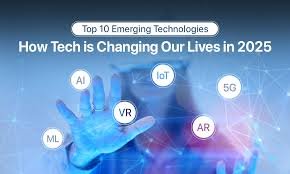The rapid pace of technological advancements continues to reshape the world in 2025. As emerging technologies evolve, industries are experiencing dramatic shifts that affect everything from daily life to global economies. Understanding these trends is crucial for staying ahead of the curve. This article highlights the most significant tech trends in 2025 that are transforming industries and influencing how we live, work, and interact with the world.
1. Artificial Intelligence (AI) and Machine Learning: Expanding Capabilities
AI and machine learning (ML) remain at the forefront of technological innovation in 2025. These technologies are moving beyond just automation and data analysis, becoming central to nearly every sector.
Key Developments:
-
Generative AI: Tools like ChatGPT and DALL·E are evolving to create more realistic and useful content, ranging from text and images to video. In 2025, we can expect generative AI to impact fields like healthcare (AI-assisted diagnostics), marketing (AI-generated ads), and entertainment (AI-driven storytelling).
-
AI in Healthcare: AI-powered solutions are revolutionizing patient care by predicting diseases, improving diagnostics, and personalizing treatment plans. Medical AI tools are now capable of identifying patterns that human doctors may miss, speeding up diagnoses and treatment processes.
-
AI in Automation: From manufacturing robots to autonomous vehicles, AI continues to streamline business operations, reduce costs, and improve efficiency.
Why It’s Important:
-
Enhanced Efficiency: AI helps businesses optimize operations, from logistics to customer service, leading to improved productivity and cost savings.
-
Personalization: AI enhances the user experience, making products and services more personalized and relevant, from online shopping recommendations to tailored health treatments.
2. Quantum Computing: Redefining Problem-Solving
Quantum computing is progressing rapidly in 2025, moving from experimental research to real-world applications. These superpowered computers use quantum mechanics to process data exponentially faster than traditional computers.
Key Developments:
-
Cryptography: Quantum computing is set to revolutionize cybersecurity by creating virtually unbreakable encryption methods. This promises to secure digital transactions and data storage in the face of increasing cyber threats.
-
Scientific Discovery: Quantum computers will be used to model complex molecules, significantly speeding up the discovery of new drugs and materials. This could lead to breakthroughs in areas like cancer treatment and sustainable energy solutions.
-
Optimization Problems: Industries such as logistics and finance are poised to benefit from quantum computing’s ability to solve complex optimization problems, improving supply chain management and financial predictions.
Why It’s Important:
-
Faster Processing: Quantum computing will solve problems that were previously too complex for traditional computers, unlocking new scientific and technological advancements.
-
Security: The ability to secure digital data with quantum encryption will transform the cybersecurity landscape, providing stronger protection against hacks and data breaches.
3. 5G Connectivity: Transforming Communication and IoT
5G technology is already rolling out worldwide and will become the norm in 2025. It promises to deliver faster speeds, lower latency, and more reliable connectivity, which will change the way we communicate, work, and interact with technology.
Key Developments:
-
Ultra-Fast Speeds: 5G networks provide speeds up to 100 times faster than 4G, enabling instant downloads, lag-free streaming, and seamless communication, even in remote areas.
-
Internet of Things (IoT): 5G’s low latency and bandwidth will allow billions of connected devices to communicate efficiently in real-time, powering smart homes, autonomous vehicles, and industrial IoT applications.
-
Augmented and Virtual Reality: With 5G, AR and VR applications can be rendered in real-time with minimal lag, enhancing immersive experiences for gaming, education, and virtual meetings.
Why It’s Important:
-
Global Connectivity: 5G technology connects people and devices at an unprecedented speed, driving the development of smart cities and autonomous transportation systems.
-
Innovation: The low latency and high speeds offered by 5G will foster new innovations in fields such as telemedicine, remote work, and entertainment.
4. Blockchain and Decentralized Finance (DeFi): Revolutionizing Financial Systems
Blockchain technology and decentralized finance (DeFi) are disrupting traditional financial systems in 2025, offering greater transparency, security, and efficiency.
Key Developments:
-
Smart Contracts: Blockchain’s ability to execute smart contracts is streamlining industries like real estate, insurance, and legal services. These self-executing contracts allow for automated transactions without intermediaries, cutting costs and reducing errors.
-
DeFi Growth: DeFi platforms, which enable financial transactions without the need for traditional banks, are expanding rapidly. These platforms allow users to lend, borrow, and trade assets with fewer restrictions and lower fees.
-
NFTs and Digital Ownership: Non-fungible tokens (NFTs) are moving beyond art and gaming into sectors like real estate, music, and fashion, offering new forms of digital ownership and investment.
Why It’s Important:
-
Financial Inclusion: DeFi platforms provide access to financial services for individuals who may not have access to traditional banking, increasing financial inclusion globally.
-
Efficiency: Blockchain reduces the need for intermediaries, making transactions faster and more cost-effective across a wide range of industries.
5. Edge Computing: Reducing Latency and Improving Efficiency
Edge computing is transforming how data is processed by moving computation closer to the source, reducing latency and increasing processing speed.
Key Developments:
-
Real-Time Processing: Edge computing enables real-time data analysis, which is crucial for applications like autonomous vehicles, smart cities, and industrial automation.
-
IoT and Smart Devices: Edge computing supports the growing number of connected devices in the Internet of Things (IoT), allowing for faster data processing and more efficient device communication.
-
Cloud Integration: In 2025, edge computing will seamlessly integrate with cloud computing, creating a hybrid environment that combines the flexibility of the cloud with the speed and efficiency of edge processing.
Why It’s Important:
-
Faster Decision Making: Edge computing reduces the time it takes to process and respond to data, making it ideal for applications that require immediate decisions, such as in healthcare or autonomous systems.
-
Improved Network Efficiency: By processing data closer to the source, edge computing reduces the burden on centralized servers, leading to faster, more efficient systems.
6. Augmented Reality (AR) and Virtual Reality (VR): Redefining User Experiences
In 2025, AR and VR are set to become mainstream, revolutionizing how we interact with digital content and enhancing immersive experiences in gaming, education, and professional environments.
Key Developments:
-
AR in Retail and E-Commerce: AR is being used to create virtual fitting rooms, allowing customers to try on clothes or see how furniture fits in their homes without leaving the house. Brands like IKEA and Sephora are already integrating AR into their shopping experiences.
-
VR in Education and Training: VR is transforming education and corporate training by providing immersive simulations that offer hands-on learning in a safe, controlled environment.
-
VR Gaming: As VR hardware improves, gaming experiences are becoming more immersive, with developers creating fully interactive virtual worlds.
Why It’s Important:
-
Enhanced User Engagement: AR and VR offer new ways to engage with content, creating more interactive, dynamic, and enjoyable experiences.
-
Training and Simulation: These technologies provide powerful tools for training, helping students and professionals practice skills in real-world scenarios without risk.
7. Robotics and Automation: Revolutionizing Industries
Robotics and automation are rapidly transforming industries, from manufacturing to healthcare, making processes more efficient and cost-effective.
Key Developments:
-
Collaborative Robots (Cobots): Cobots are designed to work alongside humans, enhancing productivity in workplaces like factories, warehouses, and assembly lines.
-
Autonomous Vehicles: In 2025, autonomous vehicles are becoming more advanced, with many cities beginning to implement driverless taxis and delivery trucks for urban logistics.
-
Healthcare Robotics: Robots are being used in surgeries, patient care, and rehabilitation, offering greater precision and efficiency in medical procedures.
Why It’s Important:
-
Increased Efficiency: Robotics and automation streamline processes, reducing labor costs and increasing output, which is especially important in industries like manufacturing and logistics.
-
Workforce Transformation: As robots take over repetitive tasks, workers can focus on higher-level, strategic tasks, enhancing overall productivity and innovation.
Conclusion: The Future of Technology in 2025
In 2025, emerging technologies like AI, quantum computing, 5G, blockchain, edge computing, AR/VR, and robotics are set to change the world in profound ways. These innovations promise to make our lives more connected, efficient, and immersive, from revolutionizing industries to enhancing everyday experiences. Staying informed about these top tech trends will help you navigate the future and harness these advancements for business growth, personal development, and technological innovation. By embracing these transformative technologies, you can be part of the exciting changes shaping our world.

